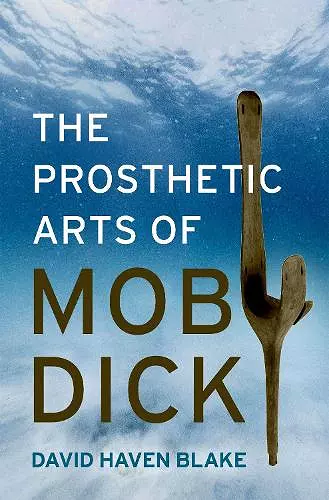The Prosthetic Arts of Moby-Dick
Format:Hardback
Publisher:Oxford University Press Inc
Published:4th Feb '25
Should be back in stock very soon

The Prosthetic Arts of Moby-Dick offers the first book-length study of how physical disability shapes one of the world's most iconic novels. For generations, readers have viewed Captain Ahab's whalebone leg as a symbol of what he lacks, the limb he lost while fighting the white whale off the coast of Japan. David Haven Blake considers that ivory leg in a historical, medical, and geo-political context. Drawing on extensive archival research, he situates Ahab's prosthesis at the center of the novel's reflections on wounding, embodiment, and the role that Islamic cultures play in American narratives of revenge. Melville had a lifelong fascination with dismemberment. From the use of assistive devices to the phenomenon of phantom limbs, he keenly imagined the experience of disability on ship.Blake connects the novel's interest in prostheses with its use of Islamic imagery to characterize overwhelming power. In this radically new analysis, he identifies the character Fedallah as the captain's most important prosthesis in piloting the captain to his final battle with Moby Dick. A key to understanding both Ahab and Ishmael, Fedallah emerges as the crutch upon which this novel of dismemberment leans. Engagingly written and spanning each stage of Melville's career, The Prosthetic Arts of Moby-Dick is an eye-opening meditation on democracy, aggrievement, and the challenges of living in a global age.
Beginning with Ahab's wounding and limb loss, David Blake weaves together a disability aesthetics running through Moby-Dick and shedding light on American democracy itself: its identity inseparable from its vulnerability, its power inseparable from its projection of violence onto Islamic cultures. A must-read for Melville scholars, and for anyone interested in American literature. * Wai Chee Dimock, Yale University *
Reflecting on the vulnerabilities of Captain Ahab, the iconic disabled figure in American literature, Blake offers a bracing reading of Moby-Dick. From his ivory leg to his bosom friend the Parsee Fedallah, Ahab relies on a set of assistive devices, or prostheses, that grant him a relational sense of being in the world. Though vengeful and destructive at last, Ahab's journey has defied ableism in both its antebellum and our contemporary iterations, and by so doing inspires us to revisit the novel, and the body politic it embodies, from the vantage point of the human and non-human, organic and inorganic, prostheses that animate the narrative. The book meets us at the intersection of disability justice and democratic reform; and as it transcends Ahab's mastery, the book envisions new ways of being and becoming with the Other within and beyond the US. * Amir Vafa, Shariz University *
Blake's book ably appraises Melville's meditations on the value of psychological and racial aggrievement in the expression of American authoritarian power. It charts how Melville rendered the 'thump' of traumatic dismemberment into a prosthetic matrix for incorporating others into the violent extension of individual retribution and national power. The powerful readings of Fedallah and his mysterious gazes reembody him into a crucial prosthesis for Ahab, but also a phantom narrator for Ishmael and Melville, in ways that pilot new insights into how Moby-Dick remains premised on geo-political dispossession of Asians and Muslims. Blake's timely analysis of Melville's mediations of mutilated bodies makes this book a prophecy for readers to remember in today's vindictive times. * Timothy Marr, University of North Carolina *
ISBN: 9780197780510
Dimensions: 239mm x 165mm x 26mm
Weight: 481g
256 pages